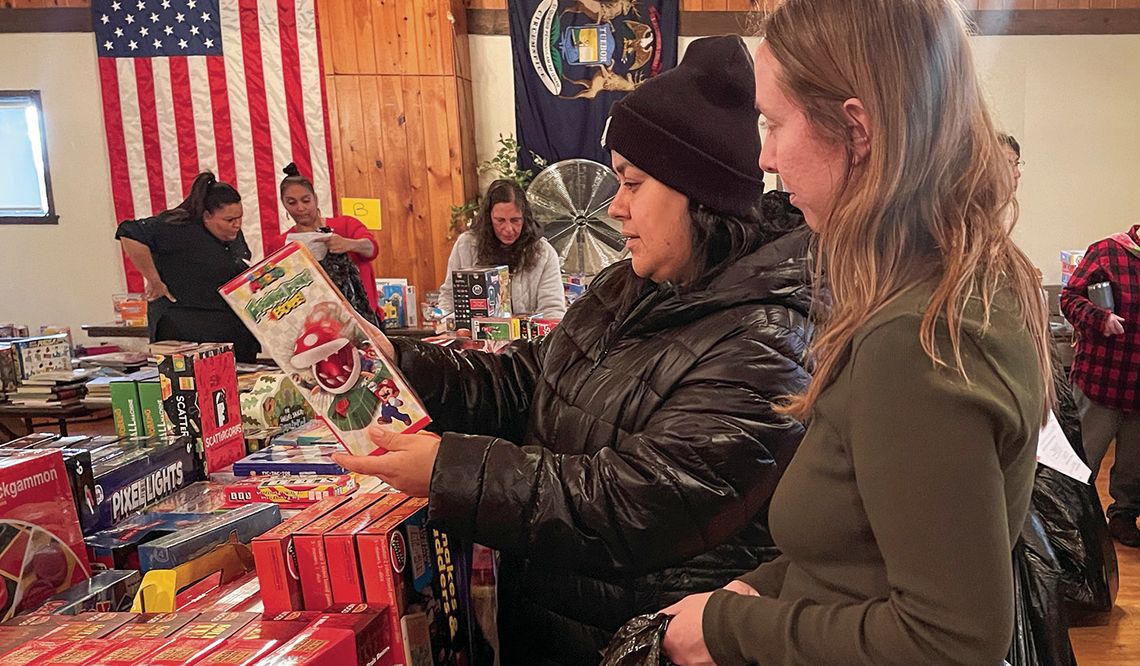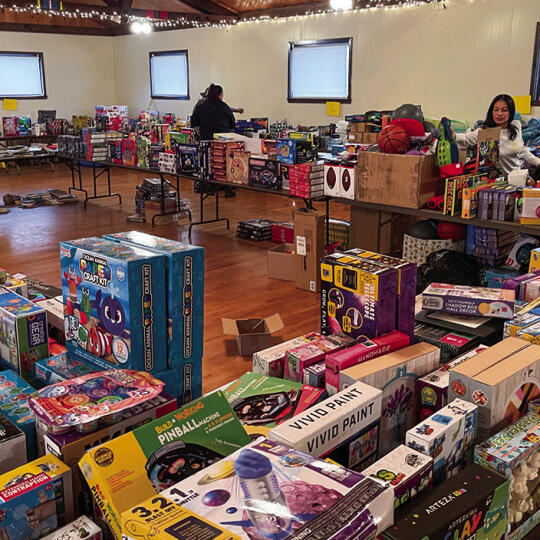Reporter’s note: A look into how a Christian-based holiday is observed in Leelanau schools represents the second of a four-part series relating the birth of Jesus Christ with how we celebrate Christmas. The first part, published in the Enterprise last week, dealt with Biblical roots for Christmas feasts. Stories about Jesus’ place in Christmas songs and why the holiday doesn’t end on Dec. 25 will follow.
It’s the first words to come out of the Bill of Rights, the keystone to American freedom that separates the United States from all other countries.
Yet interpreting the First Amendment into public policy is no easy task. Especially at Christmas, our biggest holiday and one whose roots are wrapped in Christianity.
Fulfillment of the promise of the First Amendment — for government to protect yet not promote religion — is put to the test this time of year in the school halls of Leelanau County, where Christian parents expect that Jesus Christ won’t be cleansed from the holiday and non-believing parents don’t want their children evangelized.
Those assertions might create a narrow path to follow if not for communities that respect the beliefs of others, school superintendents said when asked to be interviewed for this article.
“The big thing here is we are a tightknit community that respects one another,” said Jason Misner, superintendent of Glen Lake Community Schools. “Families are the most important part of our school district … it’s a level of respect (toward) everyone’s beliefs.”
Added Neil Wetherbee, Northport superintendent, “We don’t have a whole lot of drama in this community. A lot of that is because people here know other people. It’s easier to be hateful of people you don’t know. We’re a small community that supports each other.”
The topic can be controversial, which may have led to two superintendents declining to speak to the Enterprise on the subject. The request to participate also asked if someone else at the district might be a better source, specifically “a long-time teacher or counselor who might be informative on the subject.”
Both superintendents replied through emails.
Suttons Bay superintendent Casey Petz provided a link to board policies along with this statement: “In an effort to remain focused on the education of our students and speak directly to our families on topics that are important to them, Suttons Bay Public Schools has no further comment on this request.”
“We abide by Federal and State laws,” wrote Leland Public School superintendent Stephanie Long, “which are reflected in our board policies. This has not been an issue at LPS.”
Neither has the topic of how to handle references to Jesus Christ during Christmas been an issue at Northport or Glen Lake, whether stemming from musical selections for holiday concerts (songs based on the birth of Christ are allowed in the mix, per U.S. Department of Education guidelines) or manger scenes (they may be considered over the line, per those same guidelines).
Wetherbee said the teaching of Christianity in Northport is reserved for history classes. “A part of world history is religion. (Students) study a variety of religions, but it’s more the background behind them than current practices,” he said.
That’s also reflective of federal guidelines, which state: “Although public schools may teach about religious holidays, including their religious aspects, and may celebrate the secular aspects of holidays, schools may not observe holidays as religious events, nor may schools promote or disparage such observance by students.”
During his many years as an educator, Wetherbee has not had a student approach him seeking information about Christianity or faith.
Wetherbee embraces the First Amendment.
“I like freedom of the press, freedom of expression, freedom to assemble and freedom of religion,” he said. Misner said policies adopted by the Board of Education mandate how religious topics are handled by school personnel. The policies outline a neutral approach toward Christianity, whether during Christmas, Easter or any time in between.
On the one hand, Glen Lake policy 2270 mandates that “no District employee will promote religion in the classroom or in the District’s curriculum, or compel or pressure any student to participate in devotional exercise.”
But the policy also recognizes that a “religious consciousness has permeated the arts, literature, music and issues of morality,” Therefore, religious reference in resource materials “shall not, by itself, bar their use by the District.”
A Christmas prayer is allowed, with limitations. “However, such exercise or expression may be limited to lunch periods or other noninstructional time periods when students are free to associate,” the policy continues.
Misner added that public schools are prohibited from favoring one religion over another.
“We have displays of a variety of Christmas and holiday representations at our school, and how the holidays are expressed around the world,” he said.
The secular side of Christmas giving is embraced by both school districts. At Northport, a “stuff the bus” program recently ended with delivery of a school-bus load of gifts to the Toys for Tots program at the VFW Hall in Lake Leelanau that included clothing, shoes, snow gear, books and, of course, toys. Glen Lake organizes a “giving tree” program. Per Misner. “We have a student assistance program. If there is an expression of need for a family, especially during the holiday season, we will help provide that support.”
One school in Leelanau stakes its livelihood on Christianity not just at Christmas but throughout the year. St. Mary, located on the church parish grounds in Lake Leelanau, is the only parochial school in the county. It’s theology teacher is Mark Dunphy, who unapologetically contends that the celebration of Christmas — which includes round-the-clock commercialization — has strayed from its roots.
He likens what has happened with Christmas to celebritism.
“I’ve had students who had heard of Jesus like they had heard of Michael Jordan, but they’ve never seen Michael Jordan play. It’s a beautiful moment when something turns on and they learn about Jesus. My class is free to talk, to disagree. And the kids get a chance to evangelize, which they do in a loving way. I had three students this year who sought to be baptized. That’s a beautiful thing that happened in this building,” Dunphy said.
He says he would give up teaching if he couldn’t talk about Christ during Christmas.
“Not that I don’t love Santa and Frosty, but they pale by comparison,” Dunphy said.









